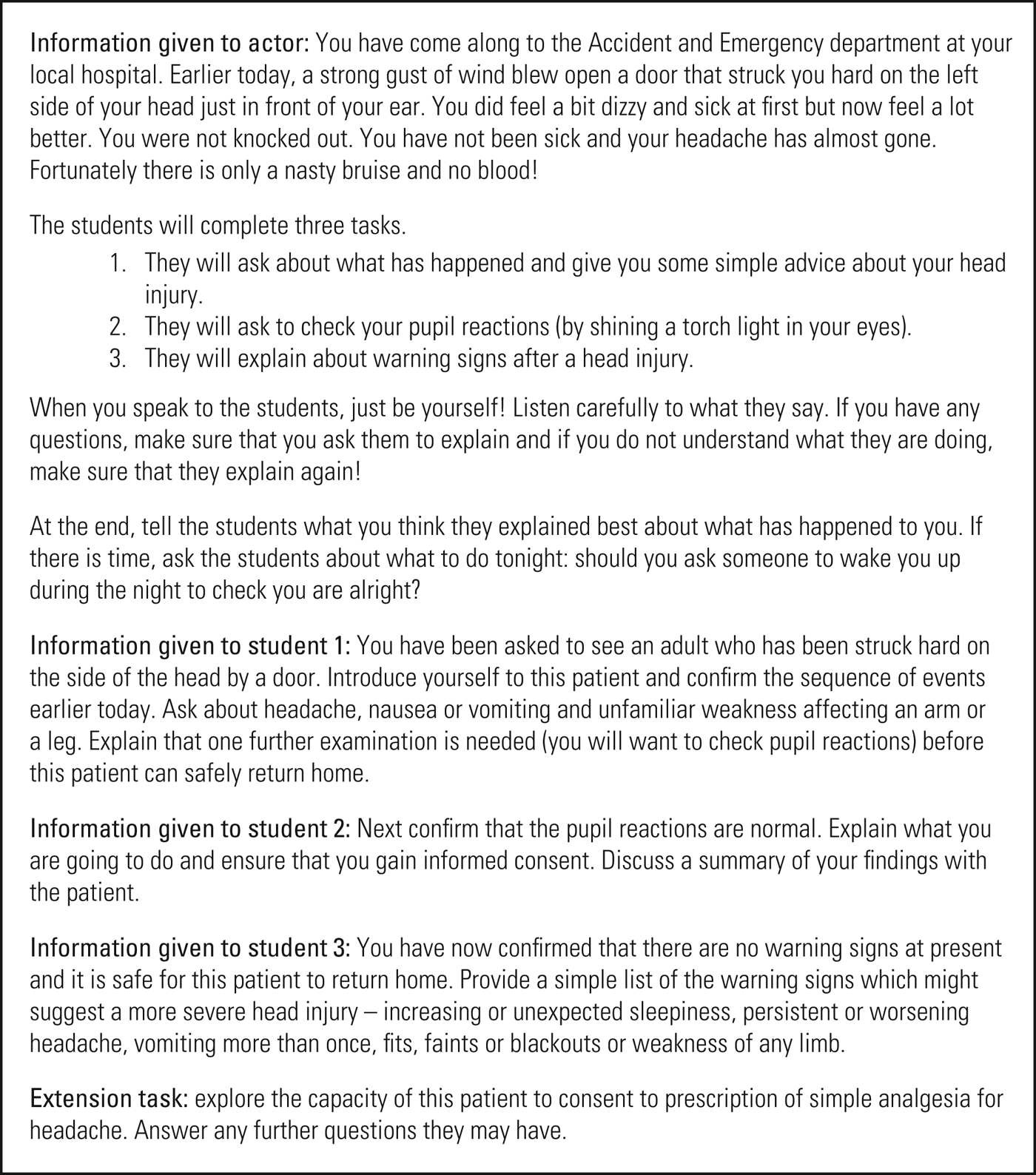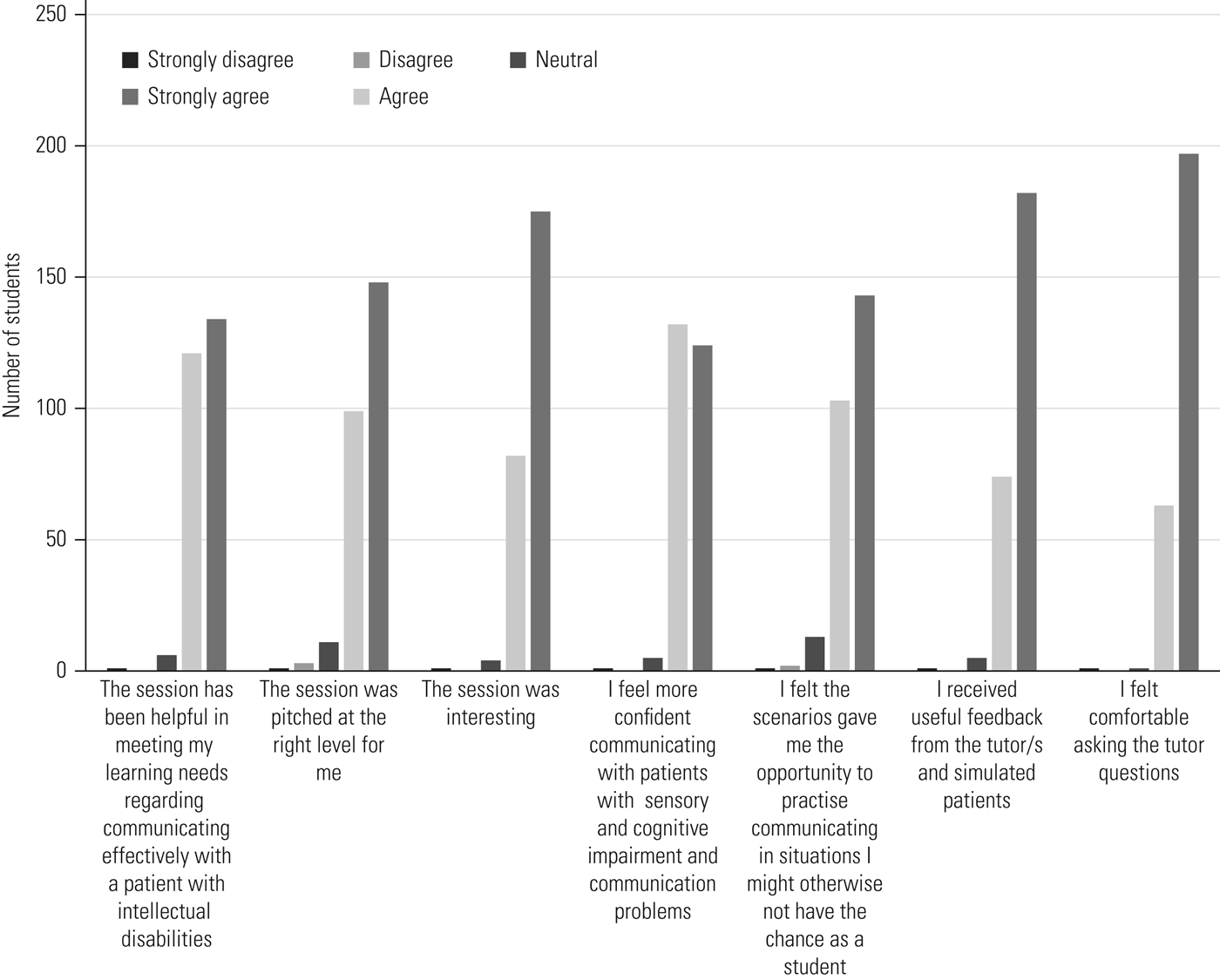Doctors must ‘communicate clearly, sensitively and effectively with all patients’ (General Medical Council 2018). Specific skills are required when communicating with vulnerable groups, for example patients with intellectual disabilities (also known as learning disabilities in UK health services). These skills are crucial and have a direct impact on healthcare outcomes (Watkins Reference Watkins and Colgate2016). People with intellectual disabilities frequently have multiple healthcare needs (Disability Rights Commission 2006), many of which reduce life expectancy. These individuals receive advice and care from health and social care professionals from multiple disciplines. Mencap (2007) explored the deaths of six people with intellectual disabilities and identified factors that contributed to their premature or preventable deaths. The report highlighted healthcare staff's lack of awareness of patient's needs, healthcare inequalities and a failure to comply with the Disability Discrimination Act 1995 (which has since been replaced by the Equality Act 2010). At the end of its report, Mencap made a number of recommendations – including provision of competency-based training about intellectual disabilities for all healthcare professionals, with the involvement of patients, their carers and families in this training. Despite these recommendations, the Learning Disability Mortality Review (LeDeR) report (2017) (University of Bristol 2016–2017) highlighted that these problems remain a barrier to healthcare for people with intellectual disabilities.
The opportunity for medical students on clinical placement to meet and communicate with patients with diverse intellectual disabilities is relatively limited, particularly early in the undergraduate medical course. We therefore developed a pioneering partnership between Cardiff University School of Medicine, Cardiff Metropolitan University, Cardiff School of Sport & Health Sciences and Hijinx, a Welsh theatre company that includes professionally trained actors with intellectual disabilities, that resulted in a workshop offering a new interprofessional learning experience.
The key principle of our approach to ‘skills-based’ (Silverman Reference Silverman, Kurtz and Draper2013) communication skills training in Cardiff is to help students to build constructive, therapeutic relationships with their patients and to learn how to gather and share information with patients. We seek to challenge unconscious beliefs and, where necessary, to change students’ attitudes. Students learn how various medical conditions can affect a patient's ability to communicate and that developing their own communication techniques can improve clinical outcomes. From the outset, we aim for our students to be ‘accurate, efficient and compassionate’.
The communication skills workshop
A pilot workshop delivered to third-year medical students in 2015 received strong positive feedback from participants. Evidence from the literature promotes the introduction of interprofessional communication skills training – in which healthcare professionals from different disciplines learn with, from and about each other to improve collaboration and quality of care – in an academic setting (Keller Reference Keller, Eggenberger and Belkowitz2013), particularly when it focuses on the development of innovative, experiential learning opportunities and those that incorporate standardised patients and feedback from faculty facilitators (Solomon Reference Solomon and Salfi2011). We therefore felt that introducing an interprofessional element would enrich the opportunities for students and improve awareness of the expertise offered by colleagues in other disciplines. As a result, in November 2016 the new interprofessional session was introduced to 300 medical students during their chronic disease teaching block and to approximately 40 SALT students per year.
Mixed groups of fourth-year medical and third-year SALT students undertake a 90 min communication skills workshop, during which they have the opportunity to role-play with actors with developmental intellectual disabilities and receive feedback from tutors, actors and peers. Students are encouraged to communicate with patients using recognised effective strategies, including the involvement of other disciplines, for example speech and language therapists and other allied health professionals, which nurtures their skills and confidence in providing healthcare to vulnerable patients while maintaining the patients’ dignity.
Hijinx actors rehearse relevant scenarios and receive training ahead of the teaching sessions (Fig. 1). The emphasis of our teaching is to encourage the development of communication skills and the importance of using simple comprehensible language, repeated where necessary. Students learn and practise a method of actively confirming the patient's retention and understanding that is considered good practice and often used by surgeons. For this technique, the medical practitioner asks the patient to explain what they have understood about the procedure or diagnosis to an accompanying relative/carer or, if none is present, as a hypothetical exercise. This allows the practitioner to assess whether the patient has indeed understood what was explained to them and to address any areas where understanding has been demonstrated to still be lacking (Royal College of Surgeons 2015). Students are encouraged to consider what the barriers to effective communication may be and identify effective methods to engage rapport quickly and to maintain it. The educational priority is consolidation of existing communication skills and development of knowledge.

FIG 1 A scenario given to an actor in a communication skills workshop.
Evaluation of the workshops
A significant barrier to accessing healthcare faced by people with intellectual disabilities arises from the language that healthcare professionals use and how much time they give individuals to communicate with them. Communication skills training allows students to develop ways of adapting language and highlights the importance of supplementing spoken communication, for example with visual aids including diagrams and with effective non-verbal communication. Role-play allows them to experience communication difficulties for themselves and provides an opportunity to practise how to facilitate good communication. An unpublished survey of students who had participated in our training workshops showed that they found this teaching rewarding and that the interprofessional nature of the course enabled them to learn more about the roles of their colleagues in other disciplines (Fig. 2). It also revealed a significant increase in the confidence and a competence change measured in terms of an increase informally observed by tutors of students in their interactions with patients with intellectual disabilities. Students find the teaching enjoyable and valuable, while the collaboration with Hijinx provides genuine and sustained employment for actors with intellectual disabilities, improving their financial independence, self-esteem and well-being.

FIG 2 Students’ (n = 262) evaluations of the interprofessional workshop on communication skills delivered to medical students and speech and language therapy students in Cardiff.
Take-home message
Our communication skills workshops provide students with a rare opportunity to practise and improve their communication skills to meet the healthcare needs of people with intellectual disabilities. They also enable Hijinx actors to make a valuable, lasting contribution to society, something rarely offered to adults with intellectual disabilities.







eLetters
No eLetters have been published for this article.